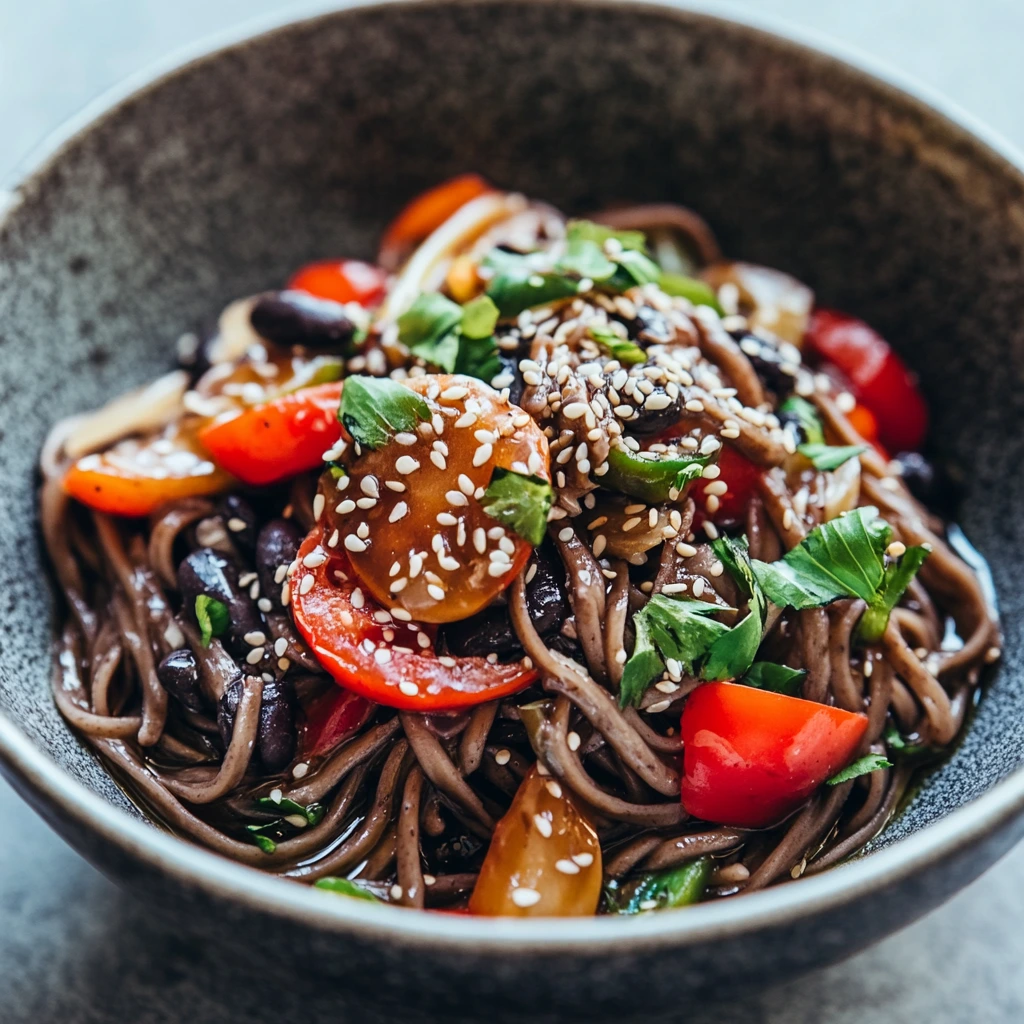Over the years, dietary habits have shifted as people prioritize healthier and more sustainable food options. Among the diverse alternatives gaining traction are healthy black bean noodles, celebrated for their health benefits and versatility in meals. Made primarily from black beans, these noodles offer a nutrient-packed, gluten-free alternative to traditional pasta. Whether you’re pursuing weight loss, boosting protein intake, or accommodating dietary restrictions, healthy black bean noodles can seamlessly fit into your lifestyle.
These noodles are especially popular among fitness enthusiasts, vegans, and those with gluten sensitivities, as they provide an impressive combination of protein, fiber, and essential nutrients. In this article, we will explore why healthy black bean noodles stand out as a nutritious choice, delve into their nutritional advantages, and examine how they can be incorporated into daily meals.
What Are Black Bean Noodles?

Healthy black bean noodles are a type of pasta made primarily from finely ground black beans, often combined with water and minimal additives. This unique composition sets them apart from conventional wheat-based or rice-based noodles. These noodles are known for their dark, almost black hue and firm texture, making them visually distinct and suitable for a variety of culinary dishes.
The Origins of Black Bean Noodles
Although pasta alternatives have been around for decades, black bean noodles have their roots in the modern health food movement, particularly in Western and Asian cuisines. They were created to address the growing demand for high-protein, low-carbohydrate foods, appealing to health-conscious individuals worldwide.
The Production Process
Making black bean noodles involves grinding black beans into a fine flour, which is then mixed with water to form a dough. This dough is shaped into noodle forms and dried for preservation. Some versions may include natural thickening agents like xanthan gum to improve texture. Importantly, the process avoids the use of refined grains or artificial additives, ensuring that the noodles retain the nutrients and benefits of black beans.
Nutritional Value of Black Bean Noodles
One of the key reasons healthy black bean noodles are considered a nutritious choice is their impressive nutritional profile. Packed with protein, fiber, and essential micronutrients, these noodles provide a well-rounded dietary option for various needs.
Macronutrient Breakdown
A single serving (about 56 grams) of black bean noodles typically contains:
- Protein: Approximately 25 grams, which is significantly higher than traditional noodles.
- Carbohydrates: Around 18 grams, primarily from complex carbohydrates.
- Fiber: Up to 12 grams, supporting digestion and gut health.
- Fats: Minimal, often less than 2 grams per serving.
Rich in Vitamins and Minerals
Black bean noodles are an excellent source of iron, magnesium, and potassium. These minerals are essential for oxygen transport, muscle function, and maintaining healthy blood pressure levels. Additionally, they provide a good dose of antioxidants, such as anthocyanins, which are responsible for the beans’ dark color and contribute to reducing inflammation.
Health Benefits of Black Bean Noodles
The health benefits of healthy black bean noodles extend far beyond their nutritional content, making them a smart choice for various dietary goals.
Heart Health
The high fiber content in black bean noodles helps reduce cholesterol levels, promoting better cardiovascular health. Soluble fiber binds to cholesterol in the digestive tract, preventing it from entering the bloodstream. Additionally, the potassium found in these noodles can help regulate blood pressure.
Weight Management
With a low glycemic index and high protein content, black bean noodles are excellent for weight management. They help keep you full for longer, reducing overall calorie intake. The fiber content slows digestion, preventing blood sugar spikes and crashes, which can lead to overeating.
Digestive Health
The significant amount of fiber in black bean noodles promotes regular bowel movements and a healthy gut microbiome. Fiber acts as a prebiotic, feeding beneficial gut bacteria and improving overall digestive health.
Suitable for Dietary Restrictions
Black bean noodles are naturally gluten-free, making them ideal for individuals with celiac disease or gluten sensitivities. They are also vegan and vegetarian-friendly, providing an excellent source of plant-based protein for those avoiding animal products.
How to Incorporate Black Bean Noodles into Your Diet

Healthy black bean noodles are not only nutritious but also incredibly versatile. Their neutral flavor and firm texture make them a great base for a variety of dishes, catering to different cuisines and dietary preferences.
Simple Meal Ideas
Black bean noodles can be used in quick and nutritious meals:
- Stir-Fries: Toss the noodles with sautéed vegetables, tofu, or lean proteins like chicken or shrimp, and finish with a savory sauce like teriyaki or sesame ginger.
- Noodle Bowls: Combine black bean noodles with fresh greens, shredded carrots, avocado, and a drizzle of peanut or tahini dressing for a balanced bowl.
- Cold Salads: These noodles are perfect for chilled pasta salads. Mix them with cherry tomatoes, cucumbers, olives, and a light vinaigrette for a refreshing meal.
Best Pairings for Sauces and Toppings
The subtle, earthy flavor of black bean noodles pairs well with a wide range of sauces and toppings:
- Asian-Inspired Sauces: Soy sauce, miso, hoisin, or chili garlic oil.
- Italian Favorites: Marinara, pesto, or Alfredo sauces bring a new twist to classic pasta dishes.
- Mexican Flavors: Top with black beans, salsa, avocado, and a squeeze of lime for a taco-inspired dish.
Versatility in Different Cuisines
Black bean noodles can adapt to a variety of cuisines, making them a pantry staple:
- Asian Cuisine: Use them as a base for ramen, pad Thai, or lo mein.
- Italian Cuisine: Substitute traditional spaghetti with black bean noodles in dishes like Bolognese or carbonara.
- Fusion Cuisine: Experiment with innovative recipes, like noodle tacos or black bean noodle sushi rolls.
Comparison with Other Types of Noodles

Comparison with Other Types of Noodles
To better understand why healthy black bean noodles are a standout option, let’s compare them to other popular types of noodles.
Black Bean Noodles vs. Wheat Noodles
- Nutritional Profile: Black bean noodles are higher in protein and fiber while being lower in carbohydrates compared to wheat noodles.
- Gluten-Free: Unlike wheat noodles, black bean noodles are suitable for gluten-intolerant individuals.
- Caloric Content: Although slightly higher in calories per serving, black bean noodles provide more nutritional value.
Black Bean Noodles vs. Rice Noodles
- Protein Content: Black bean noodles offer significantly more protein, making them a better choice for muscle repair and growth.
- Fiber Content: Rice noodles are low in fiber, whereas black bean noodles provide a hearty dose, aiding in digestion.
- Flavor: Rice noodles have a milder taste, but black bean noodles add a subtle richness that complements robust sauces.
Cost and Availability
- Cost: Black bean noodles are often priced slightly higher than traditional noodles due to their premium ingredients.
- Availability: They are becoming increasingly available in supermarkets, health food stores, and online retailers.
Who Should Eat Black Bean Noodles?
Black bean noodles cater to a variety of dietary needs, making them suitable for a diverse group of people.
People with Gluten Intolerance
For individuals with celiac disease or gluten sensitivities, black bean noodles provide a safe and tasty alternative to wheat-based products.
Vegans and Vegetarians
Black bean noodles are a plant-based protein powerhouse, supporting vegans and vegetarians in meeting their protein requirements.
Fitness Enthusiasts
With their high protein and low carbohydrate content, black bean noodles are an excellent post-workout meal option for those looking to build muscle or maintain energy levels.
Individuals Seeking High-Protein Diets
Those aiming to increase their protein intake, whether for weight management or health reasons, will benefit greatly from the nutrient density of black bean noodles.
Potential Concerns and Considerations
While black bean noodles offer numerous health benefits, it’s essential to be aware of potential concerns to ensure they fit well into your diet and preferences.
Portion Control and Calorie Considerations
Black bean noodles are nutrient-dense, which is beneficial but may require mindful portioning for those on a calorie-restricted diet. A standard serving size of 56 grams (dry) contains approximately 190-200 calories. While the high protein and fiber content promote satiety, consuming large portions may inadvertently increase overall caloric intake.
Possible Allergens or Sensitivities
Although black bean noodles are generally safe for most individuals, those with legume allergies should exercise caution. Symptoms of legume allergies can range from mild digestive discomfort to more severe reactions. If you’re trying them for the first time, consider starting with a small portion to assess tolerance.
Taste Preferences
Black bean noodles have a unique taste and texture compared to traditional pasta. Their earthy flavor may not appeal to everyone, especially if paired with light or delicate sauces. Overcoming this requires experimenting with robust sauces and bold seasonings to complement the noodles.
Frequently Asked Questions (FAQs)
To address common queries, here are detailed answers to frequently asked questions about black bean noodles.
Are black bean noodles suitable for kids?
Yes, black bean noodles are an excellent option for kids, as they are rich in protein, fiber, and essential nutrients. To appeal to younger palates, consider serving them with familiar sauces like marinara or creamy cheese.
Can they be used in traditional noodle recipes?
Absolutely! Black bean noodles can replace traditional pasta in almost any recipe. They work well in classic dishes like spaghetti Bolognese, Alfredo, and even soups like chicken noodle.
How do black bean noodles compare to shirataki noodles?
While shirataki noodles are extremely low in calories and carbohydrates, they lack the protein and fiber content found in black bean noodles. Black bean noodles are a better choice for those seeking a nutrient-dense option.
Are they easy to cook?
Yes, black bean noodles are straightforward to prepare. They typically cook in about 7-9 minutes, similar to traditional pasta. Rinse them after cooking to remove any residual starch and improve texture.
Where can you buy black bean noodles?
Black bean noodles are widely available in health food stores, large supermarkets, and online retailers like Amazon. Look for brands that use minimal additives to ensure quality.
Can black bean noodles aid in muscle building?
Yes, the high protein content of black bean noodles makes them an excellent addition to muscle-building diets. Combined with other protein sources and proper exercise, they support muscle repair and growth.
Conclusion
Black bean noodles are a standout option for anyone seeking a nutritious, versatile, and delicious alternative to traditional noodles. Packed with protein, fiber, and essential nutrients, they cater to a variety of dietary needs, from gluten-free diets to high-protein meal plans.
Their health benefits, including support for heart health, digestive wellness, and weight management, make them a valuable addition to a balanced diet. With their adaptability to different cuisines and recipes, black bean noodles offer endless possibilities for creative and wholesome meals.
Whether you’re a fitness enthusiast, a busy parent, or someone exploring healthier eating habits, healthy black bean noodles are a simple yet impactful choice. Give them a try, and enjoy the benefits they bring to your plate and your overall well-being.
To enhance your knowledge of healthy pairings, explore our Black Bean Noodles Guide. For a balanced meal, pair these noodles with Roasted Tomatoes for Pasta Sauce or savor them with a side of Vegetable Chowder.

